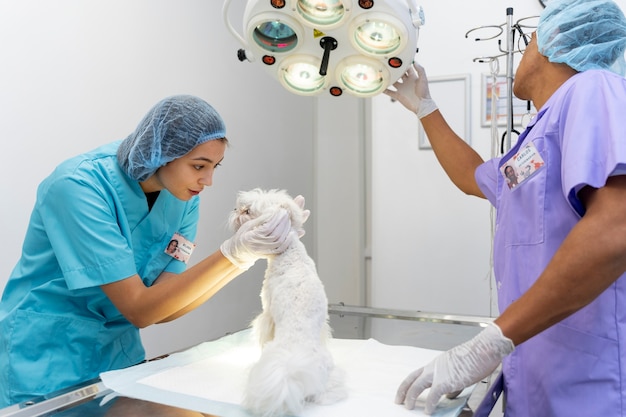Why Heartworm Prevention Is Essential for Houston Pets


Why Heartworm Prevention Is Essential for Houston Pets
Heartworm disease is a significant concern for pets living in Houston and surrounding communities because of the region’s warm, humid climate and high mosquito activity. As a pet owner, you want to keep your dog or cat safe and healthy, but understanding the risks of heartworm and the steps involved in heartworm prevention can feel overwhelming. At PetRight, our veterinary team is dedicated to providing compassionate, expert care for your pet at our conveniently located 14015 Memorial Drive, Houston, TX 77079. In this blog, we will explain why heartworm prevention is vital for pets in Houston, how to spot the warning signs, what causes heartworm disease, and the importance of regular pet heartworm testing. You will also learn how to get started with effective prevention strategies and when to schedule an appointment for your pet’s care.
With so many mosquitoes in our area, heartworm prevention in Houston is not just a seasonal concern; it should be a year-round priority for every pet parent. By the end of this article, you will have a clear understanding of how to protect your pet from this potentially life-threatening disease and why working with a quality vet near me is the best way to ensure their long-term wellbeing.
Recognizing the Problem: Signs and Symptoms of Heartworm Disease
Pet owners often ask how to know if their dog or cat may have been exposed to heartworms. While heartworm disease can develop silently, especially in the early months after infection, there are certain signs to watch for. In dogs, symptoms include a persistent cough, reluctance to exercise, fatigue after moderate activity, decreased appetite, and weight loss. As the disease advances, you might notice your pet developing a swollen abdomen due to fluid buildup, or in severe cases, sudden collapse. Cats can show more subtle or variable signs; these may include coughing or asthma-like attacks, frequent vomiting, lack of appetite, or weight loss. Some cats may experience difficulty walking, fainting, or even sudden death without prior warning.
It’s important to remember that symptoms often do not appear until the disease has progressed, which is why routine pet heartworm testing in Houston is so crucial. If you notice any of these signs in your pet, particularly if you live in an area with high mosquito activity, schedule an appointment with your veterinarian as soon as possible. Acting quickly can make a significant difference in your pet’s outcome.
Understanding the Cause: How Heartworm Disease Develops in Houston
Heartworm disease is caused by a parasitic worm, Dirofilaria immitis, which is transmitted through the bite of an infected mosquito. Houston’s climate creates an ideal environment for mosquitoes to thrive nearly year-round, making heartworm prevention in Houston an ongoing concern for pet owners. Once a mosquito carrying heartworm larvae bites your pet, the tiny larvae enter the bloodstream and begin a months-long journey through the body, eventually reaching the heart and lungs. Over time, these larvae mature into adult worms that can grow up to a foot long and cause severe damage to the heart, lungs, and surrounding blood vessels.
Both dogs and cats are susceptible, although dogs are the natural host and tend to develop more severe infections. Cats are less likely to have large numbers of adult worms but can still suffer from significant complications, even with only one or two worms present. The risk of heartworm disease is not limited to outdoor pets; indoor pets are also at risk because mosquitoes can easily enter homes.
Because of these factors, veterinary professionals in Houston recommend making heartworm prevention a consistent part of your pet’s healthcare routine. Our region’s high risk makes it essential to stay proactive, regardless of your pet’s lifestyle.
Professional Treatment and Management: What to Expect from Your Veterinarian
If your pet tests positive for heartworm disease, the next steps depend on the severity of the infection and your pet’s overall health. For dogs, treatment can involve a series of injections to kill the adult heartworms, along with medications to manage inflammation and prevent complications. Your veterinary team will likely recommend restricting your dog’s physical activity during treatment, as exercise can increase the risk of complications. Additional support such as antibiotics and heartworm preventives may also be prescribed. Treatment is closely monitored and tailored to each dog’s needs, as eliminating heartworms too quickly can be dangerous.
Heartworm disease in cats is managed differently. There is no approved medication for killing adult heartworms in cats, so treatment focuses on stabilizing your cat, managing symptoms, and supporting their body as it deals with the infection. Some cats may recover with supportive care, while others require ongoing management for respiratory issues. This is why heartworm prevention in Houston cats is just as critical as it is for dogs.
At PetRight, our veterinarians prioritize thorough pet heartworm testing and personalized treatment planning. We also offer heartworm testing and treatment services to ensure your pet receives the most current and effective care available. Our approach emphasizes regular monitoring and follow-up to safeguard your pet’s heart and lung health.
Prevention and Home Care: Keeping Your Pet Safe from Heartworm
Preventing heartworm disease is far easier, safer, and less expensive than treating an established infection. Heartworm prevention in Houston typically involves giving your pet a monthly oral or topical medication, or in some cases, an injectable product that provides protection for several months. These medications are highly effective at killing heartworm larvae before they mature and cause damage. Your veterinarian will recommend the most appropriate product based on your pet’s species, age, weight, and lifestyle.
In addition to medication, steps you can take at home include reducing your pet’s exposure to mosquitoes. This may involve minimizing outdoor activity at dawn and dusk, using pet-safe mosquito repellents, and ensuring your home is free of standing water where mosquitoes breed. Indoor cats should also receive heartworm prevention in Houston, as mosquitoes can easily enter homes.
Regular wellness care and prevention visits are the cornerstone of keeping your pet healthy year-round. During these appointments, your veterinary team will discuss your pet’s risk factors, review prevention options, and perform pet heartworm testing to confirm your pet is protected. Consistent use of preventive medication combined with annual testing is the gold standard for heartworm prevention in Houston and surrounding communities.
When to Seek Veterinary Care: Timing Is Everything
Knowing when to schedule a visit with your veterinarian is essential for effective heartworm prevention and treatment. You should arrange for pet heartworm testing in Houston before starting a prevention regimen, especially if your pet has missed any doses or if you have recently adopted a pet with an unknown medical history. Annual testing is recommended for all dogs in the region, and cats should have regular wellness examinations with heartworm risk assessments.
Contact your veterinarian immediately if you observe symptoms such as coughing, lethargy, or difficulty breathing, as these could indicate advanced heartworm disease or other serious conditions. The earlier heartworm disease is detected, the better the chances for successful management.
If your pet is due for their annual wellness examination or you have questions about heartworm prevention in Houston, reaching out to a quality vet near me ensures your pet receives the personalized attention and advanced care they deserve.
Protect Your Pet: Schedule Heartworm Prevention and Testing in Houston Today
Heartworm disease is a preventable threat that no pet owner in Houston should overlook. By recognizing the signs, understanding how the disease develops, and working closely with your trusted veterinary team, you can keep your pet safe, healthy, and happy for years to come. Proactive steps such as regular pet heartworm testing and treatment, ongoing wellness care and prevention, and consistent use of preventive medication are key to effective heartworm prevention in Houston.
If you are searching for a vet near me who is committed to your pet’s lifelong health, PetRight is here to help you every step of the way. Our experienced veterinarians offer comprehensive heartworm prevention in Houston and surrounding communities, ensuring your dog or cat is protected in our mosquito-prone climate.
To schedule your pet’s heartworm prevention consultation or annual testing, contact our veterinary team at (281) 497-6222 or visit us at our Houston location. We look forward to helping you provide the best preventive care for your beloved pet.
Disclaimer: This blog is intended for informational purposes only and should not replace individualized veterinary advice. For specific concerns about your pet’s health or heartworm status, please consult your veterinarian. You can learn more about heartworm disease and prevention from reputable sources such as the American Heartworm Society and schedule a visit with our veterinary professionals at PetRight for personalized guidance.



















